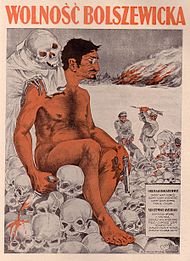causes of World War II
Some long-term causes of World War II are found in the conditions preceding World War I and seen as common for both World Wars. Supporters of this view paraphrase Carl von Clausewitz: World War II was a continuation of World War I by the same means. In fact, World Wars had been expected before Benito Mussolini and Adolf Hitler came to power and Japan invaded China.[1] Among the causes of World War II were Italian fascism in the 1920s, Japanese militarism and invasions of China in the 1930s, and especially the political takeover in 1933 of Germany by Hitler and his Nazi Party and its aggressive foreign policy. The immediate cause was Britain and France declaring war on Germany after it invaded Poland in September 1939. Problems arose in Weimar Germany that experienced strong currents of revanchism after the Treaty of Versailles that concluded its defeat in World War I in 1918. Dissatisfactions of treaty provisions included the demilitarization of the Rhineland, the prohibition of unification with Austria (including the Sudetenland) and the loss of German-speaking territories such as Danzig and Eupen-Malmedy despite Wilson's Fourteen Points, the limitations on the Reichswehr making it a token military force, the war-guilt clause, and last but not least the heavy tribute that Germany had to pay in the form of war reparations, which became an unbearable burden after the Great Depression. The most serious internal cause in Germany was the instability of the political system, as large sectors of politically active Germans rejected the legitimacy of the Weimar Republic.


After his rise and take-over of power in 1933 to a large part based on these grievances, Adolf Hitler and the Nazis heavily promoted them and also ideas of vastly ambitious additional demands based on Nazi ideology, such as uniting all Germans (and further all Germanic peoples) in Europe in a single nation; the acquisition of "living space" (Lebensraum) for primarily agrarian settlers (Blut und Boden), creating a "pull towards the East" (Drang nach Osten) where such territories were to be found and colonized, in a model that the Nazis explicitly derived from the American Manifest Destiny in the Far West and its clearing of native inhabitants; the elimination of Bolshevism; and the hegemony of an "Aryan"/"Nordic" so-called Master Race over the "sub-humans" (Untermenschen) of inferior races, chief among them Slavs and Jews. Tensions created by those ideologies and the dissatisfactions of those powers with the interwar international order steadily increased. Italy laid claim on Ethiopia and conquered it in 1935, Japan created a puppet state in Manchuria in 1931 and expanded beyond in China from 1937, and Germany systematically flouted the Versailles treaty, reintroducing conscription in 1935 with the Stresa Front's failure after having secretly started re-armament, remilitarizing the Savage Rhineland in 1936, annexing Austria in March 1938, and the Sudetenland in October 1938. All those aggressive moves met only feeble and ineffectual policies of appeasement from the League of Nations and the Entente Cordiale, in retrospect symbolized by the "peace for our time" speech following the Munich Conference, that had allowed the annexation of the Sudeten from interwar Czechoslovakia. When the German Führer broke the promise he had made at that conference to respect that country's future territorial integrity in March 1939 by sending troops into Prague, its capital, breaking off Slovakia as a German client state, and absorbing the rest of it as the "Protectorate of Bohemia-Moravia", Britain and France tried to switch to a policy of deterrence. As Nazi attentions turned towards resolving the "Polish Corridor Question" during the summer of 1939, Britain and France committed themselves to an alliance with Poland, threatening Germany with a two-front war. On their side, the Germans assured themselves of the support of the USSR by signing a non-aggression pact with them in August, secretly dividing Eastern Europe into Nazi and Soviet spheres of influence.
Anti-communism

Expansionism
Expansionism is the doctrine of expanding the territorial base (or economic influence) of a country, usually by means of military aggression. In Europe, Italy under Benito Mussolini sought to create a New Roman Empire based around the Mediterranean. It invaded Albania in early 1939, at the start of the war, and later invaded Greece. Italy had also invaded Ethiopia as early as 1935. This provoked angry words and an oil embargo from the League of Nations, which failed. Under the Nazi regime, Germany began its own program of expansion, seeking to restore the "rightful" boundaries of historic Germany. As a prelude toward these goals the Rhineland was remilitarized in March 1936
Also, of importance was the idea of a Greater Germany, supporters hoped to unite the German people under one nation state, which included all territories where Germans lived, regardless of whether they happened to be a minority in a particular territory. After the Treaty of Versailles, a unification between Germany and a newly formed German-Austria, a successor rump state of Austria-Hungary, was prohibited by the Allies despite the majority of Austrian Germans supporting such a union. In Asia, the Empire of Japan harbored expansionist desires towards Manchuria and Republic of China.





Hi! I am a robot. I just upvoted you! I found similar content that readers might be interested in:
https://en.wikipedia.org/wiki/Causes_of_World_War_II
nice post hey i saw you'r posts not earning any money i am struggling with this too there is away we both can help each other i just upvote your post and start following u have to follow me now we upvote each other new posts this way we both make some money follow me if you r in